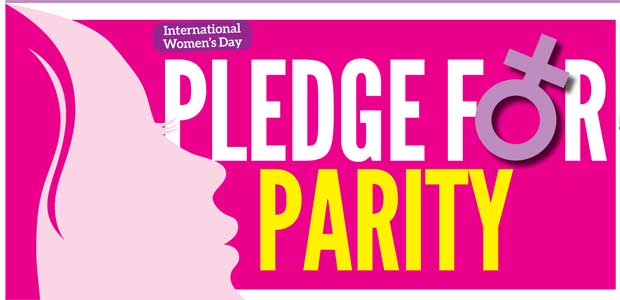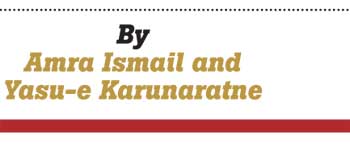|
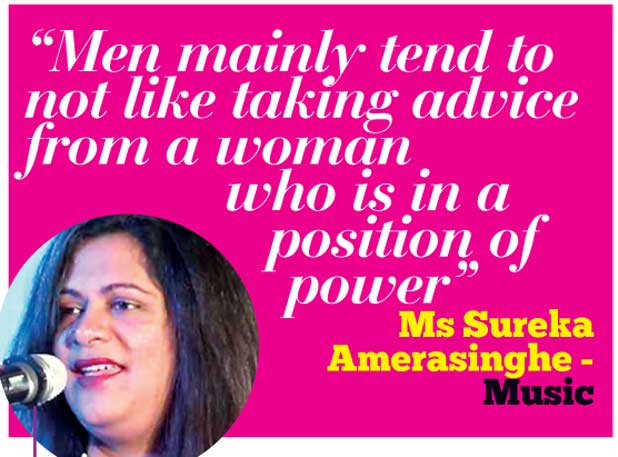
Sureka the Island’s foremost musician and highly esteemed teacher said,“Music has taken me all over the world fand has provided me with amazing opportunities to be a voice for my nation and for my soul.Since I play classical, Jazz and fusion, art and commercial music on piano, flute, violin, recorder and voice I’m constantly occupied exploring new sound worlds and cultures.”
The music world is a male dominated one, as a woman these are some of the obstacles she has faced and eventually overcome, “I have encountered many super men/boys who have treated me with utmost respect and equality like my father, my students at Royal College and other schools, male musicians and friends I’ve worked with in Sri Lanka and other countries. The respect and support of men like this has helped me be the best I can be.” “However the world at large is different. Men mainly tend to not like taking advice from a woman who is in a position of power. Talent, skill, qualifications and experience can be undermined or even belittled. There is a tendency to generalize and stereotype women and if one doesn’t fit into their preconceived notions much time can be wasted in getting a job done properly leading to frustration for everyone. However, Women reign supreme in the traditional role as a music teacher, however as a manager, a director and a leader one can face obstacles. As a performer there is the danger of women being objectified and not valued first for intellect, talents and skills.”
"I believe education is the key to solve this predicament."
To overcome such obstacles she believes,“ We should speak up against those who are unjust to women or men alike, and tell them when they are wrong and when possible prove them wrong. Take action when possible. Be just and fair at all times. “ Ms. Sureka also spoke on the women related issues present today, in Sri Lanka, “ Our main foreign revenue is procured from house maids. However, they are not respected in or out of our country. I believe education is the key to solve this predicament. We need to improve vocational and professional training in our country. This will create more jobs and therefore, we can depend on an alternative revenue for our country.”
This is her message for this year’s international women’s day, “Recognize your inborn talents and develop them to realize your full potential. Don’t sell yourself short and take a stand against any kind of abuse and do everything possible to eliminate it for yourself and others.”
|
|
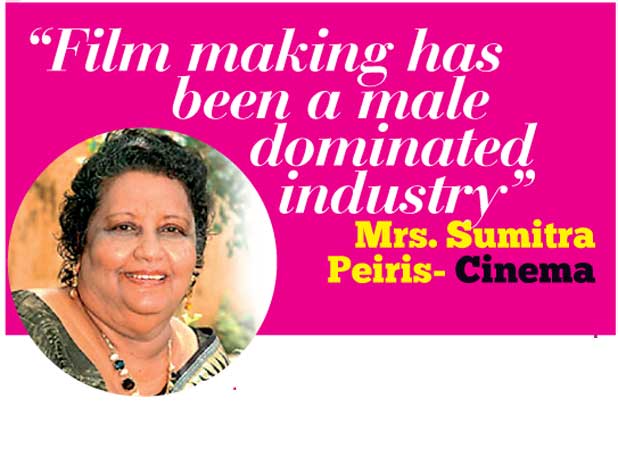
Mrs. Sumitra Peiris is the most adept, experienced and talented female film director in Sri Lanka who has directed 10 films.
In her own words, “I have always been concerned on the emotional, physical, mental, sociological concerns of women. In most of my work the predominance has been the female. I have portrayed the reality that I see, as I see it, hoping that people would empathize and care about the conditions of these women whether it is Kusum in Gehenu Lamai or Heenkelle in Sagara Jalaya. These are strong characters but circumstances and social attitudes, sometimes make them defiant or submissive.”
Mrs. Peiris was the only female student studying film making at the London School of film technique. She said,”Film making has been a male dominated industry and only few women have had the opportunity to work as directors or technicians. But things have mercifully changed now. ‘The Hurt Locker’ which was directed by a female won an Oscar. In fields like medicine women outnumber men. Times and conditions of work are not the ideal for the female. But I must say that I had more problems than just being a female. I didn’t go in for the averaged commercial films. Choices for me were limited because of the nature of work I did and not because I was a female.The gender issue got obliterated partly because of the background I came from and also because I had an exposure to the academic cinema at the London School of film technique as well as in France where I did my Post graduate studies. I think that this transcended the fact that I was just a female.” When asked if she believed that external appearance weighed more than a person’s ability at acting she said, “A certain amount of visual elegance might help you. As it is an aesthetic medium, certain aesthetics come to play. It all depends on the kind of film you’re doing. But if you are trying to do a marketable commercial film then they exploit the form, the figure and the appearance of the female. But we have never been preoccupied with that.” She also added that when she did her first film ‘Gehenu Lamai’, she had in mind a girl who would be the ideal Kusum.
This is her message for International Women’s Day: “Both the male and the female are part of humanity. When you think of everyday life, I guess we have parity but what we need is respect for each other.
"The gender issue got obliterated partly because of the background I came from and also because I had an exposure to the academic cinema at the London School"
|
|
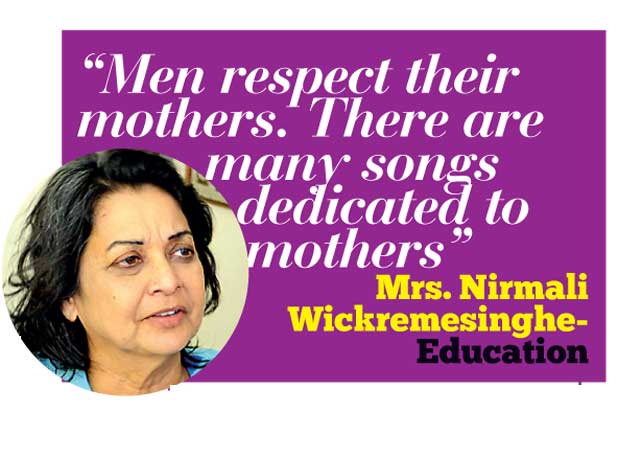
Mrs. NirmaliWickremesinghe is a teacher, principal and educationalist, with 41 years of vast experience. She has worked all around the nation and abroad in a range of different schools: government, private and international.Shebecame the principal of Ladies’ College her Alma Mater and held this post for a period of 10 years.
We asked her whether she found any distinction between girls in rural school and urban schools in which she has taught, “I have not noticed any difference between the girls of outstation girls and girls that I’ve taught in Colombo. I have found them to be equally dynamic and vocal. They were not kept down in any way in the schools, even if they were co- ed. However, when both boys and girls move from schools where they only functioned in Sinhala to a place where they have to function in English, they feel stifled and lose their confidence.”
"Education is compulsory for all children regardless of gender and therefore, it is necessary to see that such laws are strictly enforced"
When we asked her on the topic of women’s educational rights in Sri Lanka she said, “Education is compulsory for all children regardless of gender and therefore, it is necessary to see that such laws are strictly enforced.” Further, she firmly believes that differently-abled people are no longer different if they are a part of us. With this in view she installed the special education unit for girls in 2004 in Ladies College. “I hope that in 41 years as an educationalist that I have taught the girls who have gone through my hands to empower themselves to withstand gender inequality and to be strong women with confidence and faith in themselves.” said Mrs. Wickremesinghe. Expressing her ideas on the foremost women related issues she has discovered, Mrs.Wickremesinghe said, “The general attitude to women on the road and in buses, where some believe that it is their prerogative to pass comments and at some instances harass women, is very displeasing. There should be a huge campaign against it. We need much more awareness to the extent of even having boards and poster public places and buses referring this problem. It gone on for years and nothing has been done about it. “
“Men respect their mothers. There are many songs dedicated to mothers. The family is a very important unit in this country. Consequently, the respect for all women should be easily understood. Respect for women and the rest of humanity should also be incorporated in the civics and life competency lessons in the school curriculum” When asked about the exploitation of female migrant workers she noted, “ Despite being told not to leave their children they leave their families seeking foreign employment for economic reasons. They should be trained and informed of what could happen as well as what they could do if situations are dire.
|
|
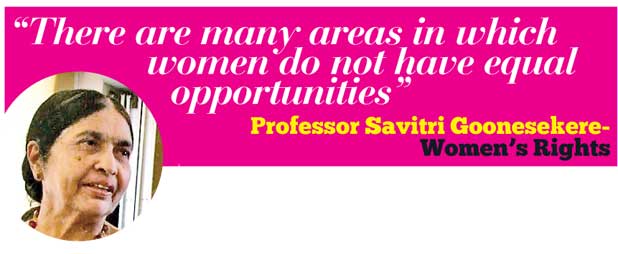
Professor Savitri Goonesekere is a jurist and an expert in the field of women’s rights.
Expressing her ideas on Sri Lanka’s position in general human rights, she said: “We have provisions in our constitution on the protection of fundamental rights. We have had good jurisprudence, the courts have done what they can, but implementation has been very weak in the areas of general human rights and that is why we have been often criticized.”
She also said that in the state sector women were not discriminated on the basis of sex, whereas in the private sector there has been gender based discrimination. “Fundamental rights are exercisable and enforceable against the state. On gender equality there have been no specific cases with regard to people alleging discrimination and that is because, particularly in the area of employment, women have equal opportunity in state employment. So discrimination has not been alleged. The state is an equal opportunities employer and it doesn’t discriminate under basis of sex in those areas. That doesn’t mean, however, that there is no discrimination in other areas as well. In the private sector, for instance, there can be discrimination. But court cases don’t reflect on discrimination and equality,”she said.
She added, “But there are many areas in which women do not have equal opportunities. For example, if you were to look at statistics on the labour force for years and for decades, the statistics for unemployment are double for women which also includes educated women. Women are definitely more unemployed. This has not been addressed.If they were to apply for a state sector job you would not see ovate discrimination because nobody has challenged and said I did not get this job because I am a woman. This is what is indicated by research. However, the private sector is not accountable. So, for example, if they refuse to employ women on the basis that they will ask for maternity leave, which is a right, that action has not been challenged, and can’t be challenged under the constitution. Because of this reason, we are told that women find it very difficult in the private sector. But there are women who have succeeded very well and who have gone very high up in the corporate ladder, for instance. But there is to some extent a glass ceiling.”
"We have had a very good record. If you look at South Asia, Sri Lanka has had much better indicators than all of them; for health, for education etc"
She also noted several areas where immediate changes should take place,”In the state sector also, at the level of political appointment, though the former and present governments have done better, there was also a glass ceiling because a higher percentage of men got those appointments by the government. Another striking area of lack of access and discrimination is the area of political participation and access to the highest levels of decision making. After 60 years of independence only 5% of women were in Parliament, local bodies and municipalities. The present government is trying to do something with a 25% quota. Then there are issues of personal security and access to livelihood which are the key issues in which women have not fared as well as they should. It is not that men are not exposed to violence but that more women are exposed to violence simply because they are women.”
Concerning the improvement of women’s rights in the country she remarked, “We have had a very good record. If you look at South Asia, Sri Lanka has had much better indicators than all of them; for health, for education etc. But our takeoff point is not the rest of South Asia because we are far ahead, so we have to judge ourselves by the international standards that we have ratified especially in the women’s convention which we have ratified from 1981, and also in our own constitution which has an article on equality. We have to judge ourselves by our own standards in relation to international standards as well and there we have not performed adequately. There has also been regression particularly under the last government where people in high office have made derogatory statements against women. That didn’t serve the cause of women well. Over time there has been an erosion of rights in some areas. This erosion is particularly noticed in the area of gender based violence. Though the law is in place, implementation is very weak. There is also not enough progress in areas that have been resisted to change, like for example, employment and political participation.”
As the foreign exchange revenue earned by women migrant workers constitutes a striking percentage of the total foreign exchange revenue earned by the country, we asked Mrs. Goonesekere if it has been recognized. She said, “In some ways yes. There have been various welfare efforts to help women migrant workers. There is a special foreign employment bureau, life skills development programmes, efforts to control the license in agencies etc. However despite all these, corrupt practices still continue and some of these women are exploited very badly because of the failure of the regulatory system. This is what is indicated by research.
|
|
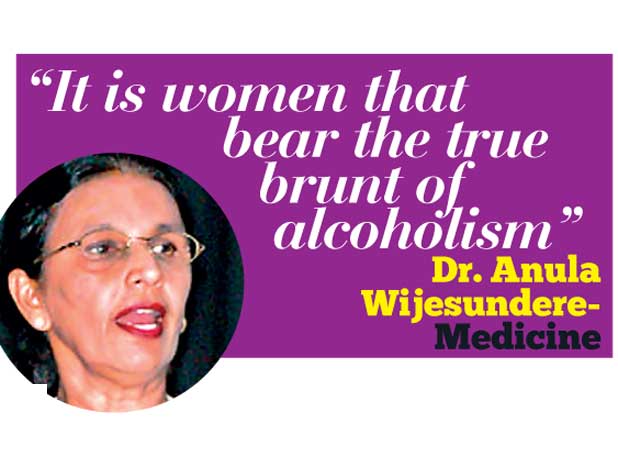
Dr Anula is an inspiring physician of whose service to the country is immeasurable. She has also earned the epithet, “The Nightingale of Sri Jayewardenepura.” She has proven to be an excellent doctor who treats her patients with utmost care and kindness.
She discussed the foremost health related issues that Sri Lankan women face today, which is gender based violence (GBV),“It is uncommon for Sri Lankan women to smoke and drink. However, it is women that bare the true brunt of alcoholism. Alcoholism, has many consequences such as road traffic accidents, Gender based violence (GBV) and liver disease. GBV is extremely high in our country, and it is mainly due to alcoholism. Men get drunk after work, and women are at the receiving end at home who, as a consequence, get battered and bruised. Women and children suffer in silence and rarely go to the police due to financial dependence on their husbands and cultural stigma.”
"No I have never been subjected to discrimination in my field."
We asked her if there were any obstacles she had to overcome as a woman in the medical field, she said, “No I have never been subjected to discrimination in my field. I was able to balance my family life, career and activities with proper time management and with the support of my husband, and our children. However,during the Malaria epidemic I hadto face it during my third pregnancy. There was no replacement for me and I was only able to take two weeks of maternity leave !” she said .
This is the message she gives to all women around the world, who are celebrating international women’s day, “Be courageous, forthright and most importantly, honest. Have a target in life, which is within your reach and you must be audacious enough to reach it in spite of all the obstacles in your way.”
|
